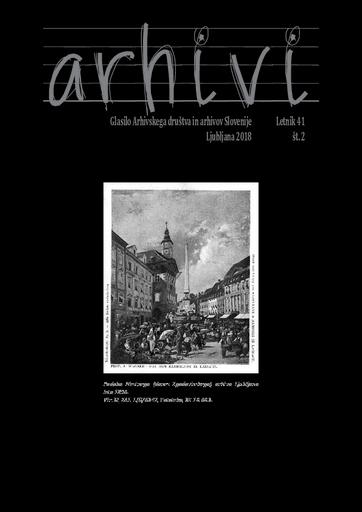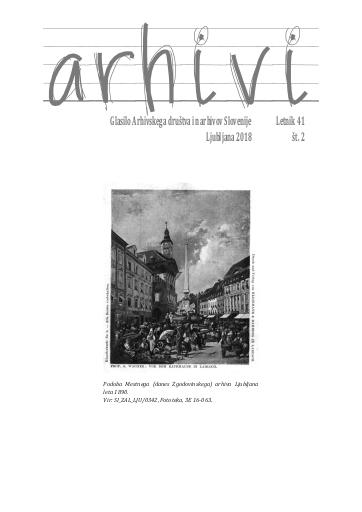/
Serijske publikacije
/
Arhivi
Izgon osebe kot kazen ali varnostni ukrep na slovenskem (1768–2017)


To delo avtorja Pavle Čelik je ponujeno pod Creative Commons Priznanje avtorstva-Nekomercialno-Deljenje pod enakimi pogoji 4.0 Mednarodna
Datoteke (1)

Opis
Prispevek je pregled pravnih predpisov, ki so v zadnjih dveh stoletjih in pol veljali na ozemlju današnje Republike Slovenije, določali pa so pogoje in postopek izgona osebe. Pri izvrševanju tega ukrepa je prihajalo tudi do napak in pristojne oblasti so izdajale podrobnejše napotke za izvajalce. V vseh političnih ureditvah, ki so veljale v Sloveniji od sredine 18. stoletja do konca 20. stoletja, so pravni predpisi omogočali izgon osebe iz kraja v drug kraj ali predel države ali v tujino, pa tudi določitev kraja za prisilno bivanje, kar je pomenilo konfinacijo, internacijo. Šele današnja slovenska oblast je pravno uredila le možnost za izgon tujca iz države, ki so ji moderno rekli odstranitev tujca.
Metapodatki (12)
- identifikatorhttps://hdl.handle.net/11686/41624
- naslov
- Izgon osebe kot kazen ali varnostni ukrep na slovenskem (1768–2017)
- Expulsion of a Person as a Penalty or a Safety Measure in Slovenian Territory (1768–2017)
- ustvarjalec
- Pavle Čelik
- soavtor
- Gregor Jenuš (gl. in odg. ur.)
- Dunja Mušič (teh. ur.)
- Petra Markuš (prev.)
- Dunja Mušič, Vanja Pfajfar (foto.)
- predmet
- ČLANKI IN RAZPRAVE
- pravne določbe o izgonu oseb
- napotki za izvrševanje tega ukrepa
- stroški
- težave in nejasnosti pri izvrševanju ukrepa
- ARTICLES AND PAPERS
- legal provisions on expulsion
- guidance for implementing this measure
- costs
- problems and uncertainties in implementing this measure
- opis
- Legal expulsion measure or the measure of confinement was the reflection of understanding of the meaning of human rights and fundamental freedoms in the entire given era. This understanding was initially under conditions of absolutist authority and legal absolutism. The time after revolution fervor in the whole Europe and Austria in 1848 marked a fundamental break in understanding of the meaning of human rights and fundamental freedoms. This was reflected in clearer conditions for legal measures or administrative measures relating to expulsion of all types, local, regional or state. After the first world war, the rule of law demonstrated consistency in understanding and ensuring the respect of freedoms and human rights. But legal provisions regarding expulsion remained in the regulations determining penal measures of courts and administrative measures of the authority. Our kingdom determined, even ordered, confinement to concentration camps for the opponents of regime, mainly communists and antifascists. Under socialism, the provisions regarding expulsion and determining the place of residence were initially maintained. The latter possibly became the harshest interference with human dignity, freedoms, and rights. This is the reason why the field of human rights was concealed and pushed to the background for several decades. However, over time, international organizations started emphasizing the demands for consolidating and respecting fundamental human rights and freedoms. Even our country was not able to remain indifferent to this. The expulsion of our citizens started to die out and then finally died out. In the independent state of Slovenia the expulsion became merely a court measure taken against foreigners. Developments in this area were the same as those of the country to which Slovenians belonged (empire, kingdom or federal state). In all the constitutions that were (also) in force in our territory, there was talk of the constitutional right of freedoms and human rights. However, the clause that the law may provide for exemptions from the constitutional provisions was added. In the independent Slovenia, this applies to our citizens and foreigners. The development of fundamental human freedoms and rights during the two centuries and a half considered was not linear and uninterrupted. Thus some rights were more respected in the time under the empire than the kingdom or federal state. Independent Slovenia must respect them due to its membership in international organizations, especially such as global organization and its specialized organizations and declarations, and the European Union
- založnik
- Arhivsko društvo Slovenije
- datum
- 2018
- tip
- besedilo
- jezik
- Slovenščina
- jeDelOd
- pravice
- licenca: ccByNcSa
